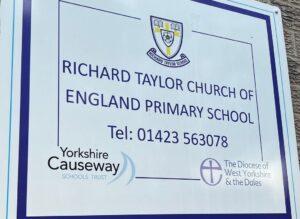Apply Online by clicking here to go directly to the NYC Admissions page.
Richard Taylor is a Church of England Primary School which converted to become part of the Yorkshire Causeway Schools Multi Academy Trust in March 2015. As such, the governing body is the Admissions Authority.
As a Church School it is committed to maintaining close links with the local parish and Diocese of Ripon. The school seeks to serve the needs of children who are members of the Anglican Church and also the primary educational requirements of the community in general by providing education of the highest quality within the context of Christian belief and practice.
Allocation of Places
The School comprises a maximum of 278 pupils. In any one academic year up to 39 children are admitted. Children are admitted to Reception Class at the commencement of the school year in which they reach their fifth birthday.
Children with an Educational Health Care Plan naming Richard Taylor Church of England Aided Primary School will be allocated a place in line with section 324 of the Education Act.
In the case of oversubscription, places are offered to those who meet the following criteria. In determining places the Governors will allocate places as follows:-
Priority 1:
Looked after children and children who were previously looked after but immediately after being looked after became subject to adoption, a child arrangements order, or special guardianship order.
Children who appear [to the admission authority of the school] to have been in state care outside of England and ceased to be in state care as a result of being adopted. (See note A in admissions policy )
Priority 2:
Siblings of children attending the school. (See note B in admissions policy)
Priority 3:
Children with a demonstrated medical/social need for a place at Richard Taylor.
(See note C in admissions policy)
Priority 4:
Foundation Places for children who attend a Christian Church living within the Deaneries of Harrogate and Ripon. Governors will allocate Foundation Stage places in accordance with the priorities set out in Note D within admissions policy.
The ecclesiastical parishes of the Deaneries of Harrogate & Ripon can be found by entering your postcode at www.achurchnearyou.com you can find your parish church and clarify which Deanery your residence is in.
Priority 5: Children of staff at the school in either or both of the following circumstances:
- where the member of staff has been employed at the school for two or more years at the time at which the application for admission to the school is made;
and/or
- where the member of staff is recruited to fill a vacant post for which there is a demonstrable skill shortage.
Priority 6: Community Places: The remaining places after Priorities 1 to 5 have been ranked will be allocated to those applicants living within the Anglican Deaneries of Harrogate and Ripon closest to the school (determined by geographic proximity to the school, by the nearest route, according to the NYCC electronic measuring system) regardless of their eligibility under any other priorities. Applicants not successful will be placed on a waiting list. The waiting list will be kept until the end of the academic year for which application was made.
Tie Breaker: Where there is a need to differentiate between applications with the same points score, priority will be determined by geographic proximity to the school, by the nearest route.
If the distance between two children’s homes and the school is the same, random allocation will be used as a tie-break to decide who has highest priority for admission. This process will be independently verified.
All distance measurements are based upon the nearest route recognised by county council mapping systems. Routes measured to determine the allocation of school places will be those recognised by the electronic mapping system used by the school admissions team. This process will be independently verified.
The school requires parents to complete a Supplementary Information Form for all applications which should be returned directly to the school office. This is available to download on the Policies page.
Please see our Admissions Policy 2026-2027 on our Policies page for more information
In-Year Co-ordinated Admissions
All in year applications for admission will be co-ordinated through the agreed North Yorkshire co-ordination scheme.
Applications for admission will be made using the Local Authority In-Year Preference Form, please speak to the school office should you require any help or guidance on this.






